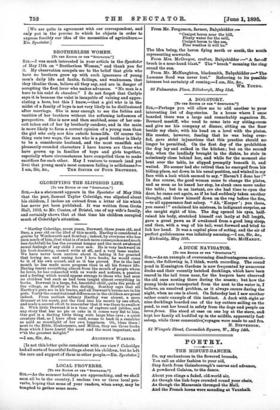GLORIFYING THE SLIPSHOD LIFE.
[TO THE EDITOR OF THE " SPECTATOR."]
Sin,—As a statement appears in the Spectator of May 18th that the poet, Samuel Taylor Coleridge, was slipshod about his children, I inclose an extract from a letter of his which has never yet been published. It was written from Greta Hall, 1S03, to Mr. Coates, of Bristol, one of my wife's family, and certainly shows that at that time his children occupied much of Coleridge's attention.
" Hartley Coleridge, seven years, Derwent, three years old, and Sara, a year old on the 23rd of this month. Hartley is considered a genius by Wordsworth and Southey ; indeed, by everyone who has seen much of him, (but what is of much more consequence andmuch less doubtful) he has the sweetest temper and the most awakened moral feelings of any child I ever saw. He is very backward in his book-learning, cannot write at ail, and a very lame reader. We have never been anxious about it, taking it for granted that loving me, and seeing how I love books, he would come to it of his own accord, and so it has proved. For in the last month he has made more progress than in all his former life. Having learnt everything almost from the mouth of people whom he loves, he has connected with us words and notions, a passion and a feeling which would appear strange to those who had seen no children but such as had been taught almost everything in books. Derwent is a large, fat, beautiful child, quite the pride of the village, as Hartley is the darling. Southey says that all Hartley's guts are in his brains, and all Derwent's brains are in his guts. Verily the constitutional differences in the children are great indeed. From earliest infancy Hartley was absent, a mere dreamer at his meals, put the food into his mouth by one effort, and made a second effort to remember that it was there to swallow it. With little Derwent it is a time of rapture and jubilee, and any story that has no pie or cake in it comes very flat to him. Our girl is a darling little thing with large blue eyes ; a quiet creature that, as I have often said, seems to bask in a sunshine as mild as moonlight of her own happiness. Oh, bless them ! next to the Bible, Shakespeare, and Milton, they are three books from which I have learnt tho most and the most important, and th the greatest delight."
[Is not this letter quite consistent with our view ? Coleridge had all sorts of beautiful feelings about his children, but he left the care and support of them to other people.—ED. Spectator.]






































 Previous page
Previous page